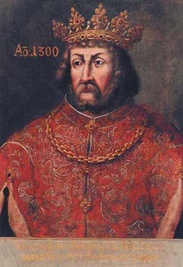
Wenceslas II - 1st part
Wenceslas was the entreated heir to King Premyslid Ottokar II. His mother, Kunigunda of Slavonia, was the granddaughter of the King of Hungary Béla IV. She brought the blood of the Hungarian Arpads into the House of the Premyslids. Wenceslas’ childhood was marked by the early loss of his father, who died in battle, and the following separation from his mother. This was the doing of Otto Margrave of Brandenburg, his own cousin who had been chosen to handle the administration of the country. It marked the beginning in Bohemia of an era called “The Bad Times”, a time of oppression and plunder generated by the Brandenburg ruler. Indeed, no sooner had Otto realized he wouldn’t come to an agreement with Kunigunda regarding the form of his regency, than he decided to at least get as rich as possible. The Brandenburg plundering was followed in 1281 by very bad harvests and famine. Wenceslas was interned in the Bezdez castle, where he lived in really meager conditions, considering he was the royal prince. This situation probably contributed to his poor health. Wenceslas was physically weak, he rather looked like a girl and he was affected by a mental instability related to his renowned fear of cats and storms.
The nobility eventually forced Otto to release Wenceslas who was nominally named king, under the regency of his mother. This period was marked by the power battle between the nobility clique led by bishop Tobias of Bechyne, and the clique of the Witigonens led by the renowned Zavish of Falkenstein. The widow queen was on the side of Falkenstein, who became her lover around that time (whispering tongues however say he already was involved with her during the lifetime of Premyslid Ottokar II). The charismatic Falkenstein soon also won the favor of Wenceslas, who saw in him the father he never got to know too well. This meant the group around Tobias was pushed aside and Falkenstein’s word was decisive when it came to the governing of the country. He also managed to stabilize the country, even though in the process he made an enemy of Rudolf I of Habsburg, Roman King. In 1285 Wenceslas gave his consent for the marriage of Zavish and his mother, who however died shortly after. It was a terrible blow for Wenceslas. The king got then fixated on Falkenstein,
but at the same time he started realizing their differences and their relationship got more difficult. As the king grew up, he stopped appreciating the dominant role of the proud Witigonen. He consented to his stepfather marrying another granddaughter of Béla, Elisabeth of Hungary, and rumors had it that Zavish was aiming for the royal crown. The young king, who sometimes had fits of paranoia, let these rumors completely overtake him and believing that his stepfather would eventually want to deposit him, he double-crossed and captured him in 1289, having called him in under the pretext of a christening ceremony. This stage culminated with the famous episode that involved going around all the rebellious Witigonens with the captured Falkenstein, and eventually his execution (1290).
Wenceslas thus seized utter power. He was a complicated man. He never learnt to write but was interested in art and his court soon became a famous destination for European artists. The king was affected by sudden changes of temper, engaging in wild drinking and debauchery sprees only to then repent wearing a penitent’s robe. He was very devout and was generous towards the church’s estates, which however never prevented him from fathering numerous bastards. He was married to Judith of Habsburg, the daughter of Rudolf King of the Romans, and had 10 children with her.
His generousness brought Wenceslas the good graces of the Church. He also knew very well how to get along with the Czech nobility, with which he chose a less authoritarian approach than his father, a decision that appeared to be fruitful. The country soon started to flourish and Wenceslas slowly started expanding the country, in particular towards Poland, thus systematically strengthening the position of the Czech lands. In the last decade of the 13th century, rich deposits of silver were discovered in Kutna Hora, resulting in the great growth of the Czech kingdom. Wenceslas gained control over the flow of silver and in 1300 he started to mint Czech groschens that soon became a preferred currency abroad. The renown of Wenceslas grew over the years and he began to occupy himself with daring plans, for the completion of which he hired highly competent people such as his chancellor Peter of Aspelt.







